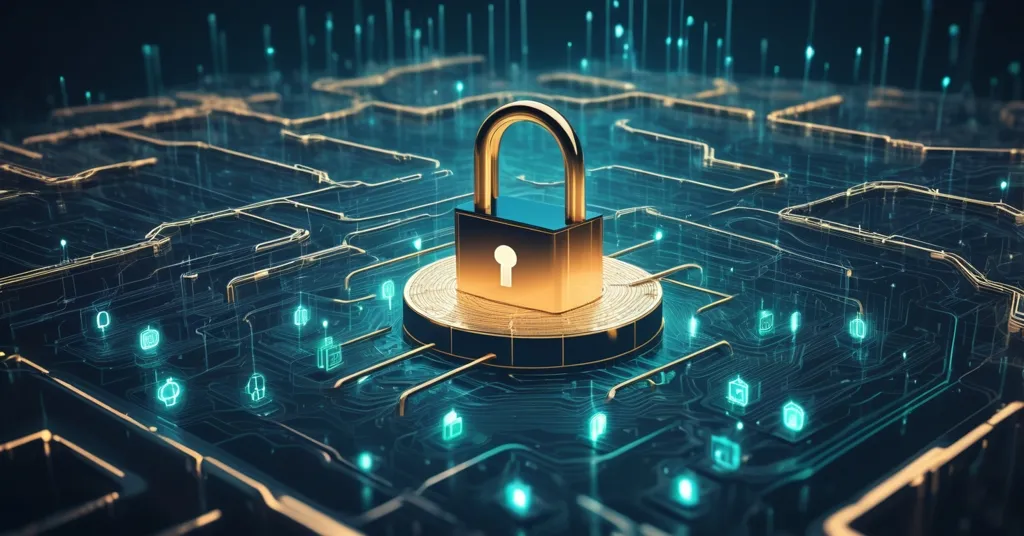Amazon Bedrock and Thales Boost AI-Crypto Privacy with Tokenization Tech

Securing AI and Crypto Privacy: Amazon Bedrock Guardrails and Thales Forge a Path for Data Protection
Amazon Web Services (AWS) and Thales have teamed up to tackle one of the biggest headaches in generative AI: protecting sensitive data without breaking the systems that rely on it. By blending Amazon Bedrock Guardrails’ knack for spotting personal info with Thales’ reversible tokenization tech, this partnership offers a robust solution for secure data handling in AI workflows—a concept with surprising relevance for Bitcoin and blockchain enthusiasts obsessed with privacy and autonomy.
- Key Innovation: Amazon Bedrock Guardrails detects sensitive data in AI interactions, while tokenization replaces it with secure, reversible placeholders.
- Core Partner: Thales CipherTrust Data Security Platform drives tokenization, ensuring data utility for authorized users.
- Crypto Connection: Privacy-first principles could inform solutions for DeFi, wallets, and other blockchain applications facing regulatory pressure.
Unpacking Amazon Bedrock Guardrails: A Digital Watchdog for AI
Imagine an AI system as a chatty assistant handling your financial queries or health records. Now imagine it accidentally spilling your name, email, or credit card number into the open. That’s where Amazon Bedrock Guardrails steps in. This AWS tool scans every input you feed into an AI model and every response it generates, sniffing out personally identifiable information (PII). When it spots something sensitive, it either blocks the data outright or slaps on a generic mask—like replacing your name with {NAME}—to keep it from leaking.
“Amazon Bedrock Guardrails helps detect sensitive information, such as PII, in standard format in input prompts or model responses.”
It’s a neat safeguard, especially as businesses in finance and healthcare lean on AI for everything from customer service to data analysis. But there’s a catch with masking: it’s a one-way trip. Once your data is hidden behind a placeholder, it’s unusable for any downstream process needing the real info. For industries juggling strict privacy laws with operational needs, that’s a dealbreaker.
Tokenization: Locking Data Away, But Keeping the Key
This is where tokenization enters the chat, and it’s the game-changer in this AWS-Thales collaboration. Unlike masking, which buries data forever, tokenization swaps sensitive info for “tokens”—random strings that mimic the original format but have no mathematical link to it. A tokenized phone number still looks like a string of digits, but it’s meaningless without the key to unlock it. Best of all, it’s reversible. Authorized systems can “detokenize” and retrieve the real data when needed. Learn more about how to integrate tokenization with Amazon Bedrock Guardrails for enhanced security.
“Tokenization offers a complementary approach to this challenge. Unlike masking, tokenization replaces sensitive data with format-preserving tokens that are mathematically unrelated to the original information but maintain its structure and usability.”
Thales CipherTrust Data Security Platform powers this process, working hand-in-hand with Bedrock Guardrails. First, Guardrails flags the sensitive stuff and applies a basic mask. Then, Thales replaces that mask with a unique token. These tokens can safely flow through AI models or other systems, and when the time comes, the original data can be restored for authorized use. Think of it as stashing your valuables in a locker: they’re safe from prying eyes, but you’ve still got the combination to get them back.
For regulated sectors like finance—where a data breach can cost millions—or healthcare, where lives are on the line, this balance of security and functionality is huge. It’s a way to comply with heavy-handed laws like GDPR (General Data Protection Regulation, a strict European privacy framework) or PCI DSS (Payment Card Industry Data Security Standard, rules for secure card transactions) without crippling your operations.
The Workflow: High-Tech Security Without the Headaches
Behind the scenes, this solution is a complex dance of AWS services working in sync. User inputs come through an API Gateway, workflows are orchestrated by Step Functions, and serverless Lambda functions handle the processing. Guardrails scans for PII, Thales tokenizes it, and the system churns along securely. If you’re not a cloud engineer, don’t sweat the details—the point is that this setup locks down sensitive data while keeping the gears turning.
Take a financial advisory app as an example. A customer sends a query loaded with PII—say, an email address or account number. The system detects it, swaps it for tokens, and lets the AI analyze the request without risking exposure. When it’s time to reply to the customer, the tokens are swapped back to the original data for authorized use. It’s seamless, secure, and compliant with the regulatory alphabet soup.
“By combining these technologies, organizations can implement stronger privacy controls while preserving the functionality of their generative AI applications and related systems.”
Why Bitcoin and Crypto Fans Should Pay Attention
Now, let’s talk about why this matters to the Bitcoin and blockchain crowd. On the surface, an AWS-Thales partnership might seem like a corporate yawn, miles away from the decentralized ethos of crypto. But privacy is the common thread tying generative AI and cryptocurrency together. Whether it’s shielding a user’s identity in a DeFi (Decentralized Finance) protocol or stopping an AI from leaking bank details, the challenge is the same: protect the data without breaking the system.
Picture a DeFi lending platform. Users submit personal info for KYC (Know Your Customer, a regulatory ID check) or AML (Anti-Money Laundering, rules to block illicit funds), but exposing that data risks hacks or overreach by nosy governments. A system inspired by this AWS-Thales approach—detecting sensitive info, tokenizing it, and processing it securely—could be a blueprint. Tokenized data could zip through smart contracts for loan approvals, only reverting to real info for authorized steps. This could also fit Bitcoin wallet services, NFT marketplaces, or payment processors needing to juggle privacy with legal demands.
But let’s not get carried away with optimism. Bitcoin maximalists and decentralization purists will likely roll their eyes at this. Why the hell would you trust centralized behemoths like AWS or Thales to guard your data when crypto’s whole point is ditching the middlemen? If the token vault—the central database mapping tokens to real data—gets compromised, it’s as bad as an exchange hack draining your BTC. And don’t kid yourself: the cost and complexity of this tech scream Big Tech gatekeeping, leaving smaller crypto projects or open-source devs out in the cold, mining privacy solutions with a rusty pickaxe.
Could we do better on-chain? Zero-knowledge proofs (zk-proofs, a cryptographic trick to verify data without revealing it) already fuel privacy coins like Zcash and are baked into Ethereum upgrades. They’re clunky—slow to compute and tough to scale—but they’re truer to crypto’s soul than leaning on AWS. This AWS-Thales model might spark ideas for tokenized privacy in blockchain, but don’t expect a plug-and-play fix for Satoshi’s vision anytime soon.
No Bullshit: The Challenges and Ugly Truths
Let’s cut through the hype—this isn’t a magic wand for AI or crypto privacy. Rolling out this system takes deep pockets and serious know-how. AWS infrastructure fees, Thales licensing costs, and the brainpower to glue it all together make it a playground for corporate giants, not the scrappy crypto startups we cheer for. If you’re a small DeFi project dreaming of this level of data protection, good luck—it’s like trying to solo mine Bitcoin with a laptop in 2023.
Then there’s the risk. Tokenization sounds ironclad, but if hackers crack the token vault, your “secure” data is toast, just as exposed as a custodial wallet after a breach. Centralized points of failure are the kryptonite of any system, whether it’s a token database or a shady exchange holding your keys. And let’s be real: handing data security to AWS and Thales feels like a middle finger to decentralization. Are you cool with Big Tech playing bouncer at the crypto club while preaching autonomy?
Still, props where they’re due. This partnership nudges us toward responsible innovation, a lesson crypto needs as regulators circle like vultures. It shows that pushing tech forward—be it AI or Bitcoin—doesn’t have to mean sacrificing privacy. But damn, we’ve got to be smarter about who we trust and how we build.
“This solution provides a practical framework for builders to use the full potential of generative AI with appropriate safeguards.”
Critical Questions for Crypto Enthusiasts
- What is Amazon Bedrock Guardrails, and how does it secure AI data?
It’s an AWS service that detects sensitive info like names or account numbers in AI inputs and outputs, blocking or masking them to prevent leaks during processing. - How does tokenization outshine masking for crypto use cases?
Tokenization swaps sensitive data for reversible tokens that keep the original format, ensuring usability for DeFi or wallet apps, unlike masking which kills data utility permanently. - Can this AWS-Thales solution work directly for Bitcoin or blockchain?
Not straight off the shelf, but its secure, reversible data handling could inspire privacy frameworks for crypto platforms wrestling with user data and compliance. - What stops crypto projects from jumping on this data security tech?
Steep costs, technical hurdles, and dependence on centralized players like AWS clash with decentralization’s core, driving some toward on-chain options like zk-proofs. - Why should Bitcoin advocates care about AI privacy tools?
As AI merges with crypto for trading bots, analytics, or interfaces, locking down privacy without losing functionality is key to safeguarding trust and freedom. - Does centralization kill the vibe for crypto-inspired tokenization?
For diehards, absolutely—relying on corporate giants for security spits on crypto’s ethos. But for practical projects, it might be a temporary bridge to decentralized maturity.
This AWS-Thales alliance marks a gutsy step toward fusing generative AI’s raw power with rock-solid data protection. For the Bitcoin and blockchain space, it’s not the final answer, but it’s a loud hint at what’s achievable when innovation squares up with responsibility. The future of finance—whether fueled by satoshis or algorithms—hinges on defending user privacy and freedom without compromise. We’re all about accelerating toward a decentralized horizon, but let’s not stumble over basic protections on the way. Keep challenging the status quo, keep building, and let’s ensure the tools we wield truly serve the fight for autonomy.



